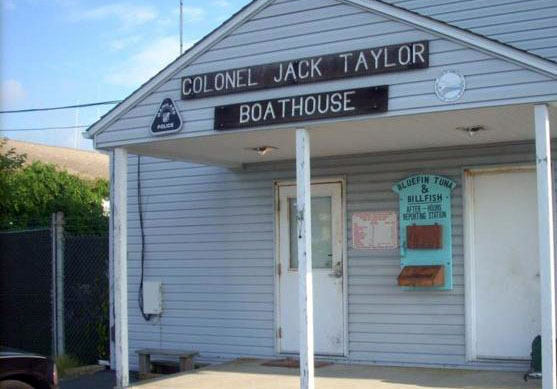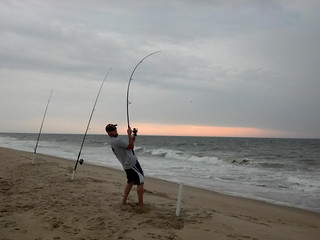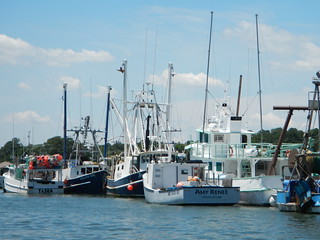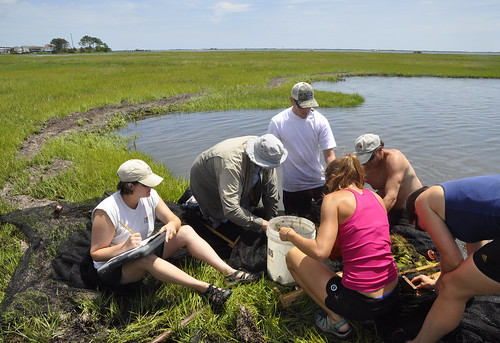
Introduction
Maryland's coast hosts many different fish communities. In Maryland's Atlantic waters and federal waters off Maryland's coast, migratory species such as black sea bass, spiny dogfish, and summer flounder can be found. Maryland's Coastal Bays are nursery areas for species such as summer flounder, black sea bass, weakfish, American eel, and bluefish. Species such as sea robins, puffers, lizardfish, stingrays and other coastal species are often encountered in the Coastal Bays. As a result of this diversity, Maryland's coast offers recreational and commercial fishermen opportunities to harvest many different species.
In support of these diverse fisheries, and to promote healthy coastal ecosystems, Maryland Department of Natural Resources Fishing and Boating Services created the Coastal Fisheries Program. Since 1972, the Coastal Fisheries Program biologists have been monitoring Maryland's Coastal Bays fish populations and providing support to recreational and commercial fishermen. Throughout that time, fisheries management has changed; fishermen have become more efficient at catching fish and fisheries are more closely monitored for stock status. The Coastal Fisheries Program is continuously changing to meet the needs of Maryland citizens.
About
Finfish populations in Maryland's Coastal Bays are primarily monitored by the Coastal Fisheries Program. This is a program within the State of Maryland Department of Natural Resources, Fishing and Boating Services. They conduct fisheries independent research and work with for hire, commercial and recreational fishermen, seafood dealers, state and federal management agencies, and other local organizations.
Maryland's Coastal Fisheries
Recreational Fisheries

There are diverse inshore and offshore recreational fishing opportunities out of Ocean City, Maryland. Inshore opportunities abound from boats (private, rental, or charter), piers, bridges, bulkheads, jetties, and surf fishing. Inshore anglers catch summer flounder, black sea bass, tautog, croaker, spot, kingfish, red drum, bluefish, rays, skates, and sharks. Offshore, billlfishes, swordfish, tunas, mahi mahi, wahoo, tilefish, and sharks are frequently caught. Tautog, black sea bass, and summer flounder are abundant closer to shore.
For more information on recreational fishing opportunities along Maryland's coast, please go to:
Commercial Fisheries

The commercial fishing fleet out of Ocean City, Maryland is small and diverse in gears and species. Common gears include trawls, gill nets, pots, long lines, and dredges. Trawlers operate only in the ocean and target species such as
horseshoe crabs,
black sea bass, and
summer flounder. Gill netters work in the coastal bays and the ocean targeting species such as
striped bass,
spiny dogfish, smooth dogfish,
croaker,
spot,
monkfish,
menhaden, and
bluefish. Different types of pots are used in the coastal bays and ocean and are species dependent. Species targeted with pots include American lobster, black sea bass, blue crabs, Jonah crabs, and whelk. Long lines are used to catch highly migratory species offshore. Dredges are used to target scallops in the ocean. Commercial fishermen submit landings information to state and federal agencies depending on the species and permits required.
Mission

Like all agencies, the Department of Natural Resources exists because the citizens have identified a need for the work we do. Marylanders recognize that the health of our society and economy is dependent on the health of our environment. The Department of Natural Resources leads Maryland in securing a sustainable future for our environment, society, and economy by preserving, protecting, restoring, and enhancing the State's natural resources.
Fisheries Service works in the Department of Natural Resources to meet those goals by:
- Developing a management framework for the conservation and equitable use of fishery resources
- Managing fisheries in balance with the ecosystem for present and future generations
- Monitoring and assessing the status and trends of fisheries resources
- Providing access to high quality, diverse, accessible fishing opportunities
In the Coastal Fisheries Program, we address the goals of Fisheries Service through conducting surveys, working with our management partners, and working within our own agency to meet the needs of Maryland's citizens.
The majority of our work is related to the Coastal Bays Fisheries Investigation. In 1972, biologists started a fisheries monitoring program in Maryland's Coastal Bays. Since then, over 130 species of fishes, 26 mollusks, and 11 macroalgae have been collected. The survey design is intended to meet three objectives:
- Characterize the stocks and estimate relative abundance of juvenile and adult marine and estuarine species in the Coastal Bays and near-shore Atlantic Ocean.
- Develop annual indices of relative abundance, age and length frequencies, and other needed information necessary to assist in the management of regional and coastal fish stocks.
- Delineate and monitor areas of high value as spawning, nursery, and/or forage location for finfish in order to protect against habitat loss or degradation.
Outside of the formal mission statements and objectives, each of us does this job for more personal reasons. Working for Fisheries Service on Maryland's Coast is something each of us does because we have a passion for the outdoors, fishing, natural resource conservation, science, preserving the seafood industry, Maryland's Coastal Bays. Our positions are rewarding, if sometimes difficult.
Publications
Over the years the Coastal Fisheries Program and Shellfish programs have written and contributed too many publications pertaining to the Coastal Bays. These reports are available from the Maryland Department of Natural Resources Library by emailing
[email protected].
Investigations
Annual ReportsMD Catch Card
CensusOther Reports
by Project Staff
Featured
Coastal ArticlesReports
for Coastal Bays
Theses using data
from investigationPublications using data
from investigationCooperative
Publications
Top↑
Investigation of Maryland's Atlantic Ocean
and coastal bay finfish stocks: Annual Reports
Casey, J. F., R.C. Raynie, and A. E. Wesche. 1991. Investigation of Maryland's Atlantic Ocean and coastal bay finfish stocks. Federal Aid Project No. F-50-R. Maryland Department of Natural Resources, Tidewater Administration. Annapolis, MD.
Casey, J. F., S. B. Doctor, and A. E. Wesche. 1992. Investigation of Maryland's Atlantic Ocean and coastal bay finfish stocks. Federal Aid Project No. F-50-R. Maryland Department of Natural Resources, Tidewater Administration. Fisheries Division. Annapolis, MD.
Casey, J. F., S. B. Doctor, and A. E. Wesche. 1993. Investigation of Maryland's Atlantic Ocean and coastal bay finfish stocks. Federal Aid Project No. F-50-R. Maryland Department of Natural Resources, Tidewater Administration. Fisheries Division. Annapolis, MD.
Casey, J. F., S. B. Doctor, and A. E. Wesche. 1994. Investigation of Maryland's Atlantic Ocean and coastal bay finfish stocks. Federal Aid Project No. F-50-R. Maryland Department of Natural Resources, Tidewater Administration. Fisheries Division. Annapolis, MD.
Casey, J. F., S. B. Doctor, and A. E. Wesche. 1995. Investigation of Maryland's Atlantic Ocean and coastal bay finfish stocks. Federal Aid Project No. F-50-R. Maryland Department of Natural Resources, Fisheries Service. Annapolis, MD.
Casey, J. F., S. B. Doctor, and A. E. Wesche. 1996. Investigation of Maryland's Atlantic Ocean and coastal bay finfish stocks. Federal Aid Project No. F-50-R. Maryland Department of Natural Resources, Fisheries Service. Annapolis, MD.
Casey, J. F., S. B. Doctor, and A. E. Wesche. 1997.Investigation of Maryland's Atlantic Ocean and coastal bay finfish stocks. Federal Aid Project No. F-50-R. Maryland Department of Natural Resources, Fisheries Service. Annapolis, MD.
Casey, J. F., S. B. Doctor, and A. E. Wesche. 1998. Investigation of Maryland's Atlantic Ocean and coastal bay finfish stocks. Federal Aid Project No. F-50-R. Maryland Department of Natural Resources, Fisheries Service. Annapolis, MD.
Casey, J. F., S. B. Doctor, and A. E. Wesche. 1999. Investigation of Maryland's Atlantic Ocean and coastal bay finfish stocks. Federal Aid Project No. F-50-R. Maryland Department of Natural Resources, Fisheries Service. Annapolis, MD.
Casey, J. F., S. B. Doctor, and A. E. Wesche. 2000. Investigation of Maryland's Atlantic Ocean and coastal bay finfish stocks. Federal Aid Project No. F-50-R. Maryland Department of Natural Resources, Fisheries Service. Annapolis, MD.
Casey, J. F., S. B. Doctor, and A. E. Wesche. 2001. Investigation of Maryland's Atlantic Ocean and Coastal Bay Finfish Stocks. Federal Aid Project No. F-50-R. Maryland Department of Natural Resources Fisheries Service. Annapolis, MD.
Casey, J. F., S. B. Doctor, and A. E. Wesche. 2002. Investigation of Maryland's Atlantic Ocean and Coastal Bay Finfish Stocks. Federal Aid Project No. F-50-R. Maryland Department of Natural Resources Fisheries Service. Annapolis, MD.
Casey, J. F. and S. B. Doctor. 2003. Investigation of Maryland's Atlantic Ocean and Coastal Bay Finfish Stocks. Federal Aid Project No. F-50-R-13. Maryland Department of Natural Resources Fisheries Service. Annapolis, MD.
Luisi, M., S. Doctor, and Staff of the MDNR Atlantic Program. 2005. Investigation of Maryland's Atlantic Ocean and Coastal Bay Finfish Stocks: Annual Report 2004. Federal Aid Project No. F-50-R-14. Maryland Department of Natural Resources Fisheries Service. Annapolis, MD.
Bolinger, A., S. Doctor, A. Luettel, M. Luisi, and G. Tyler. 2006. Investigation of Maryland's Atlantic Ocean and Coastal Bay Finfish Stocks: 2006 Report. Federal Aid Project No. F-50-R-15. Maryland Department of Natural Resources Fisheries Service. Annapolis, MD.
Bolinger, A., S. Doctor, A. Luettel, M. Luisi, and G. Tyler. 2007. Investigation of Maryland's Atlantic Ocean and Coastal Bay Finfish Stocks: 2007 Report. Federal Aid Project No. F-50-R-16. Maryland Department of Natural Resources Fisheries Service. Annapolis, MD.
Bolinger, A., S. Doctor, C. Kennedy, A. Luettel, and G. Tyler. 2008. Investigation of Maryland's Atlantic Ocean and Coastal Bay Finfish Stocks: 2008 Report. Federal Aid Project No. F-50-R-17. Maryland Department of Natural Resources Fisheries Service. Annapolis, MD.
Doctor, S., C. Kennedy, A. Luettel, G. Tyler, and A. Willey. 2009. Investigation of Maryland's Atlantic Ocean and Coastal Bay Finfish Stocks: 2009 Report. Federal Aid Project No. F-50-R-18. Maryland Department of Natural Resources Fisheries Service. Annapolis, MD.
Capossela, K., S. Doctor, C. Kennedy, A. Luettel, G. Tyler, and A. Willey. 2010. Investigation of Maryland's Atlantic Ocean and Coastal Bay Finfish Stocks: 2010 Report. Federal Aid Project No. F-50-R-19. Maryland Department of Natural Resources Fisheries Service. Annapolis, MD.
Doctor, S., C. Jones. C. Kennedy, G. Tyler, and A. Willey. 2011. Investigation of Maryland's Atlantic Ocean and Coastal Bay Finfish Stocks. Federal Aid Project No. F-50-R-20. Maryland Department of Natural Resources Fisheries Service. Annapolis, MD.
Doctor, S., C. Jones. C. Kennedy, G. Tyler, and A. Willey. 2012. Investigation of Maryland's Atlantic Ocean and Coastal Bay Finfish Stocks: 2012 Final Report. Federal Aid Project No. F-50-R-21. Maryland Department of Natural Resources Fisheries Service. Annapolis, MD.
Doctor, S., C. Kennedy, G. Tyler, C. Weedon, and A. Willey. 2013. Investigation of Maryland's Atlantic Ocean and Coastal Bay Finfish Stocks: 2013 Final Report. Federal Aid Project No. F-50-R-22. Maryland Department of Natural Resources Fisheries Service. Annapolis, MD.
Barker, L., S. Doctor, C. Kennedy, G. Tyler, C. Weedon, and A. Willey. 2014. Investigation of Maryland's Atlantic Ocean and Coastal Bay Finfish Stocks: 2014 Final Report. Federal Aid Project No. F-50-R-23. Maryland Department of Natural Resources Fisheries Service. Annapolis, MD.
Doctor, S., G. Tyler, C. Weedon, and A. Willey. 2019. Investigation of Maryland's Atlantic Ocean and Coastal Bay Finfish Stocks: July 2018 - June 2019 Final Report. Federal Aid Project No. F-50-R-27. Maryland Department of Natural Resources. Annapolis, MD.
Maryland Catch Card Census
Tyler, G. and A. Willey. 2022. Maryland Catch Card Census. Maryland Department of Natural Resources Fishing and Boating Services.
Tyler, G. and A. Willey. 2021. Maryland Catch Card Census. Maryland Department of Natural Resources Fishing and Boating Services.
Tyler, G. and A. Willey. 2020. Maryland Catch Card Census. Maryland Department of Natural Resources Fishing and Boating Services.
Tyler, G. and A. Willey. 2019. Maryland Catch Card Census. Maryland Department of Natural Resources Fishing and Boating Services.
Tyler, G. and A. Willey. 2018. Maryland Catch Card Census. Maryland Department of Natural Resources Fishing and Boating Services.
Tyler, G. and A. Willey. 2017. Maryland Catch Card Census. Maryland Department of Natural Resources Fishing and Boating Services.
Tyler, G. and A. Willey. 2016. 2016 Maryland Catch Card Census Program for Atlantic Bluefin Tuna, Billfish, and Sharks. Maryland Department of Natural Resources Fishing and Boating Services.
Tyler. G. and A. Willey. 2015. Survey of Atlantic Bluefin Tuna (ABT), Billfish (White Marlin, Roundscale Spearfish, Blue Marlin, Swordfish and Sailfish) and Shark Recreational Landings in Maryland. Maryland Department of Natural Resources Fisheries Service.
Tyler, G., C. Kennedy, and A. Willey. 2014. Survey of Atlantic Bluefin Tuna (ABT), Billfish (White Marlin, Roundscale Spearfish, Blue Marlin, Swordfish and Sailfish) and Shark Recreational Landings in Maryland. Maryland Department of Natural Resources Fisheries Service.
Tyler, G., S. Doctor, C. Kennedy, and A. Willey 2013. Survey of Atlantic Bluefin Tuna (ABT) and Billfish (White Marlin, Blue Marlin, Swordfish and Sailfish) Recreational Landings in Maryland. Maryland Department of Natural Resources Fisheries Service.
Tyler, G., S. Doctor, and C. Kennedy 2012. Survey of Atlantic Bluefin Tuna (ABT) and Billfish (White Marlin, Blue Marlin, Swordfish and Sailfish) Recreational Landings in Maryland. Maryland Department of Natural Resources Fisheries Service.
Tyler, G., S. Doctor, and C. Kennedy 2011. Survey of Atlantic Bluefin Tuna (ABT) and Billfish (White Marlin, Blue Marlin, Swordfish and Sailfish) Recreational Landings in Maryland. Maryland Department of Natural Resources Fisheries Service.
Tyler, G., S. Doctor, and C. Kennedy 2010. Survey of Atlantic Bluefin Tuna (ABT) and Billfish (White Marlin, Blue Marlin, Swordfish and Sailfish) Recreational Landings in Maryland. Maryland Department of Natural Resources Fisheries Service.
Tyler, G., S. Doctor, and C. Kennedy 2009. Survey of Atlantic Bluefin Tuna (ABT) and Billfish (White Marlin, Blue Marlin, Swordfish and Sailfish) Recreational Landings in Maryland. Maryland Department of Natural Resources Fisheries Service.
Tyler, G., A. Bolinger, S. Doctor, and C. Kennedy 2008. Survey of Atlantic Bluefin Tuna (ABT) and Billfish (White Marlin, Blue Marlin, Swordfish and Sailfish) Recreational Landings in Maryland. Maryland Department of Natural Resources Fisheries Service.
Tyler, G., A. Bolinger, S. Doctor, and M. Luisi. 2007. Survey of Atlantic Bluefin Tuna (ABT) and Billfish (White Marlin, Blue Marlin, Swordfish and Sailfish) Recreational Landings in Maryland. Maryland Department of Natural Resources Fisheries Service.
Tyler, G., A. Bolinger, S. Doctor, and M. Luisi. 2006. Survey of Atlantic Bluefin Tuna (ABT) and Billfish (White Marlin, Blue Marlin, Swordfish and Sailfish) Recreational Landings in Maryland. Maryland Department of Natural Resources Fisheries Service
Tyler, G., A. Bolinger, S. Doctor, and M. Luisi. 2005. Maryland Atlantic Bluefin Tuna and Billfishes, and Swordfish Creel Census Study Report, 2005. Maryland Department of Natural Resources Fisheries Service.
Pevler, A., J. Casey, and S. Doctor. 2003. [Maryland' Bluefin Tuna Sportfishing Creel Census Study Report]. Maryland Department of Natural Resources Fisheries Service.
Pevler, A., A Wesche, J. Casey, and H. Speir. 2002. 2002 Maryland' Bluefin Tuna Sportfishing Creel Census Study Report. Maryland Department of Natural
Rodriguez, A., A Wesche, J. Casey, and H. Speir. 2001. 2001 Maryland' Bluefin Tuna Sportfishing Creel Census Study Report. Maryland Department of Natural Resources Fisheries Service. Resources Fisheries Service.
Other Reports by Project Staff
John A. Sweka, Kristen A. Anstead, David R. Smith, Linda Barry, Jordan Zimmerman, Steve Doctor, Craig Weedon, James Gartland, Yan Jiao, Francesco Ferretti, and Eric M. Hallerman. 2025. Recovery of Delaware Bay horseshoe crabs following harvest reductions. U.S. Fish and Wildlife Service, Atlantic States Marine Fisheries Commission, U.S. Geological Survey , New Jersey Department of Environmental Protection, Delaware Division of Fish and Wildlife, Virginia Institute of Marine Science, Maryland Department of Natural Resources Fishing and Boating Service.
Weedon C., S. Doctor, G. Tyler and A. Willey. 2024. DNR Coastal Bays Survey Juvenile Fish and Habitat, Coastal Bays Scientific and Technical Advisory Committee Presentation, University of Maryland Center for Environmental Science Horn Point Laboratory, Maryland Department of Natural Resources Fishing and Boating Service.
Weedon C., S. Doctor, G. Tyler and A. Willey. 2022. Juvenile finfish relative abundance surveys in Maryland’s Coastal Bays. American Fisheries Society Presentation, Baltimore, Maryland Department of Natural Resources Fishing and Boating Service.
Casey, J. F. 1982. Benthos and finfish: a study of the effects of tidal fluctuation over a coastal bay shoal. Maryland. Dept. of Natural Resources.
Casey, J. F. 1992. Results of a study of cull rings and their use in crab pots in Maryland waters. Maryland Dept. of Natural Resources, Tidewater Administration, Fisheries Service. Annapolis, Maryland.
Casey, J. F. 1995. Analysis of crab harvest in Maryland's coastal bays. Fisheries technical memo no. 4. Maryland Dept. of Natural Resources, Tidewater Administration, Fisheries Service. Annapolis, Maryland.
Casey, J. F. 1996. Effects on crab catch by number and placement of cull rings in crab pots in Chesapeake Bay and the St. Martin's River, Maryland. Maryland Dept. of Natural Resources, Tidewater Administration, Fisheries Service. Annapolis, Maryland.
Casey, J. F. 1997. Local concerns involving catches by out-of-state commercial fishing vessels operating out of the port of Ocean City, Maryland. Fisheries Technical Memorandum No. 7. Maryland Dept. of Natural Resources, Tidewater Administration, Fisheries Service. Annapolis, Maryland.
Casey, J. F. 1997. Commercial Trawling within Maryland's state waters of the Atlantic Ocean. Fisheries Technical Memo No. 8. Maryland Dept. of Natural Resources, Tidewater Administration, Fisheries Service. Annapolis, Maryland.
Casey, J. F. 1999. Commercial and recreational fishing gears used in Maryland tidewater and nearshore Atlantic Ocean: Fisheries Technical Memo No. 17. Maryland Dept. of Natural Resources, Fisheries Service. Annapolis, Maryland.
Casey, J. F. 1999. Current status of important finfish stocks in Maryland's coastal bays: Technical Report No. 30. Maryland Dept. of Natural Resources, Tidal Fisheries Division. Annapolis, Maryland.
Casey, J. F. 2001. Three New Exotic Species of the Chesapeake and Coastal Regions. Fisheries Technical Memo No. 20. Maryland Dept. of Natural Resources, Fisheries Service. Annapolis, Maryland.
Casey, J. F. and Alan E. Wesche. 1997. Commercial trawling within Maryland's state waters of the Atlantic Ocean: Fisheries Technical Memo No. 8.
Casey, J. F., S. B. Doctor, and A. E. Wesche. 2000. The blue crab resources of Maryland's coastal bays: a description of the commercial and recreational fisheries and the current status of the stocks. Maryland Dept. of Natural Resources, Fisheries Service. Annapolis, Maryland.
Casey, J. F., S. B. Doctor, and A. E. Wesche. 2001. Blue Crabs in Maryland's Coastal Bays 2001 Annual Report. Fisheries Technical Memo No. 25. Maryland Dept. of Natural Resources, Fisheries Service. Annapolis, Maryland.
Casey, J. F., S. B. Doctor, and A. E. Wesche. 2001. A Pilot Survey of Maryland's coastal bays to determine locations of overwintering sites of mature female blue crabs. Fisheries Technical Memo No. 26. Maryland Dept. of Natural Resources, Fisheries Service. Annapolis, Maryland.
Casey, J. F., S. B. Doctor, and A. E. Wesche. 2001. A study of collapsible crab traps as used by recreational crabbers in the coastal bays of Maryland. Maryland Dept. of Natural Resources, Fisheries Service. Annapolis, Maryland.
Wesche. A. 1997. Maryland's coastal bays as shark nursery areas: Fisheries Technical Memo No. 10. Maryland Dept. of Natural Resources, Fisheries Service. Annapolis, Maryland.
Featured Coastal Articles on Fisheries Website by Project Staff
Casey, J. Life History of Black Sea Bass and Fishing for Them off Maryland's Coast. Maryland Dept. of Natural Resources, Fisheries Service. Annapolis, Maryland.
dnr.maryland.gov/fisheries/Documents/blkseabass.pdf
Casey, James F. 2001. Three New Exotic Species of the Chesapeake and Coastal Regions. Fisheries Technical Memo No. 20. Maryland Dept. of Natural Resources, Fisheries Service. Annapolis, Maryland.
Casey, J. and H. Speir. Managing Maryland's Recreational Bluefin Tuna Fishery. Maryland Dept. of Natural Resources, Fisheries Service. Annapolis, Maryland.
dnr.maryland.gov/fisheries/Documents/bfttagging.pdf
Doctor, S. Horseshoe Crab Spawning. Maryland Dept. of Natural Resources, Fisheries Service. Annapolis, Maryland.
dnr.maryland.gov/fisheries/Documents/hsc0404.pdf
Doctor, S. The Status of Summer Flounder in Maryland During 2000. Maryland Dept. of Natural Resources, Fisheries Service. Annapolis, Maryland.
dnr.maryland.gov/fisheries/Documents/summerflounder.pdf
Weedon. C. 2003. Wreck Diving in Maryland. Maryland Dept. of Natural Resources, Fisheries Service. Annapolis, Maryland.
dnr.maryland.gov/fisheries/Documents/divewreckstory.pdf
Reports for Coastal Bays
Tarnowski, Mitchell. 2002. Coastal Bays Hard Clam Fishery Management Plan. Maryland Dept. of Natural Resources, Fisheries Division. Annapolis, Maryland.
Tarnowski, Mitchell. A History of The Hard Clam Fishery in the Maryland Coastal Bays. Maryland Dept. of Natural Resources, Fisheries Division. Annapolis, Maryland.
Lukacovic, Rudolph. 2005. Diamondback terrapin and crab pot interactions and effect of turtle excluder devices on crab catch in Maryland's Coastal Bays. Maryland Dept. of Natural Resources, Fisheries Division. Annapolis, Maryland.
Theses using data from the Coastal Bays Fisheries Investigation
Barkman, Jennifer. 2011. Assessment of populations with spatially explicit dynamics and the consequences for marine protected areas. M.S. Thesis, Marine, Estuarine, and Environmental Sciences, University of Maryland, College Park, Maryland.
drum.lib.umd.edu/bitstream/1903/11640/1/Barkman_umd_0117N_12015.pdf
Colton, Amanda. 2011. An evaluation of the synchronization in the dynamics of blue crab (callinectes sapidus) populations in the western Atlantic. M.S. Thesis, Marine, Estuarine, and Environmental Sciences, University of Maryland, College Park, Maryland.
drum.lib.umd.edu/bitstream/1903/12023/1/Colton_umd_0117N_12602.pdf
Murphy, R. F. 2005. Fish assemblage structure in Maryland's coastal lagoon complex. M.S. Thesis, Marine, Estuarine, and Environmental Sciences, University of Maryland, College Park, Maryland.
drum.lib.umd.edu/bitstream/1903/3007/1/umi-umd-2807.pdf
Publications using data from the Coastal Bays Fisheries Investigation
Peters, R. and P. Chigbu. 2017. Spatial and Temporal patterns of abundance of juvenile black sea bass (Centropristis striata) in Maryland coastal bays. Fishery Bulletin. 115: 504-516.
Love, J. W., P. Chigbu, and E. B. May. 2009. Environmental Variability Affects Distributions of Coastal Fish Species (Maryland). Northeastern Naturalist. 16:2, 255-268.
Love, J. W. and E. B. May. 2007. Relationships Between Fish Assemblage Structure and Selected Environmental Factors in Maryland's Coastal Bays. Northeastern Naturalist. NOAA Living Marine Resources Cooperative Science Center, University of Maryland Eastern Shore, Princess Anne, MD.
Murphy, R.F. and D.H. Secor. 2006. Fish and Blue Crab Assemblage Structure in a U.S. Mid Atlantic Coastal Lagoon Complex. Estuaries and Coasts. 29: 1121–1131.
Pincin, J. S., M. J. Wilberg, L. Harris, and A. Willey. 2013. Trends in relative abundance of fishes in Maryland's coastal bays during 1972-2009. Estuaries and Coasts. 37: 791–800.
Cooperative Publications
Bohlen, C., and W. Boynton. 1999. Today's treasures for tomorrow: status and trends report on Maryland's Coastal Bays. University of Maryland. Solomons, Maryland.
Maryland Coastal Bays Program. 1999. Today's treasures for tomorrow: towards a brighter future: a comprehensive conservation and management plan for Maryland's Coastal Bays. Maryland Coastal Bays Program. Berlin, Maryland.
Today's Treasures for Tomorrow
Maryland Department of Natural Resources, Coastal Bays Fishery Advisory Committee. 2001. Coastal Bays Blue Crab Fishery Management Plan. Annapolis, MD.
Wazniak, C., M. Hall, C. Cain, D. Wilson, R. Jesien, J. Thomas, T. Carruthers, and W. Dennison. 2004. State of the Maryland Coastal Bays. Maryland Department of Natural Resources, Maryland Coastal Bays Program, and the University of Maryland Center for Environmental Science. Annapolis, Maryland.
State of the Bays 2004
W.C. Dennison, J.E. Thomas, C.J. Cain, T.J.B. Carruthers, M.R. Hall, R.V. Jesien, C.E. Wazniak, & D.E. Wilson. 2009. Shifting sands: environmental and cultural change in Maryland's coastal bays. University of Maryland Center for Environmental Science.
ian.umces.edu/
Maryland Coastal Bays Program. 2015. Comprehensive Conservation and Management Plan, Ocean City, Maryland (revised 2015), first published in 1999. Maryland Coastal Bays Program. Berlin, Maryland.
Willey, A. L., L. S. Barker, and M. Sampson. 2016. A comparison of circle hook and J hook performance in the recreational shark fishery off Maryland. Fishery Bulletin. 114, 3: 370-372.
st.nmfs.noaa.gov/spo/FishBull/1143/willey.pdf